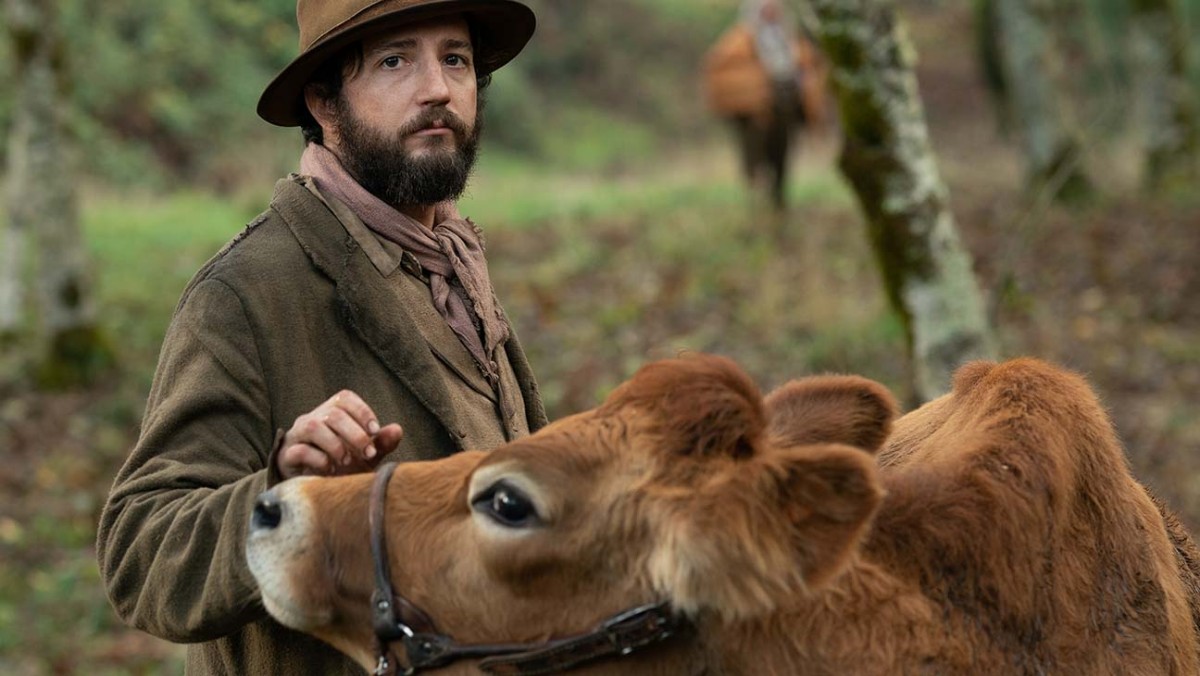A tender, quiet, and minimalist ode to friendship, community, and nature (and also the cruelty of capitalism), filmmaker Kelly Reichardt returns to the Pacific Northwest for her latest minute and nuanced drama, “First Cow” (though arguably, she’s barely ever left). A North Western set in the 1800s, and a two-hander, “First Cow” is perhaps a mélange of two of her works, the struggle found in the pioneering Chuck Wagon days of “Meek’s Cutoff” (also set in the 1800s Oregon), and “Old Joy,” an unassuming and artful tale of comradery taking place in the lush forests of Washington state.
Co-written by Jonathan Raymond, who has written or helped pen almost all of Reichardt’s work (“Old Joy,” “Wendy and Lucy,” “Meek’s Cutoff”) and based on his book “Half Life,” “First Cow” is faint, deliberately paced filmmaking where you can often hear a pin drop. But in its tiny way, the modest and gentle little film is moving and poetic. Yet, there’s no denying “First Cow” is bare-bones and possess what feels like a sketch of a plot.
READ MORE: Our Nine Most-Anticipated Films Of The 2019 Telluride Film Festival
John Magaro (“Not Fade Away”) plays Cookie Figowitz, the cook for a party of unruly and volatile fur trappers trekking through the Oregon Territory in the 1820s. One night while foraging for mushrooms, Cookie comes upon a naked and starving King Lu (newcomer Orion Lee), a shivering Chinese immigrant on the run from Russians who want revenge (Lu killed a man, in retaliation for murdering his friend). In most movies, this intrigue would be the story, but Reichardt’s rarely interested in such conventions. Instead, as their acquaintance blooms and becomes a partnership, through King Lu’s capitalist savvy and Cookie’s ability to whip up delicacies if/when he has the right ingredients, they build a successful business enterprise, from making sumptuous fried cakes that travelers and town’s people practically fight over.
The problem, however, is the entire endeavor relies on stealing the milk from the only dairy cow in the territory which belongs to an affluent baron played by Toby Jones (René Auberjonois, Ewen Bremner, Scott Shepherd, Gary Farmer, and Lily Gladstone from “Certain Women” all co-star in various tiny parts as locals).
Jones’ wealthy landowner character soon gets wind of Cookie’s cakes and Liu’s business and begins to employ them on his own to entertain other prosperous guests of repute, but this only puts their deception dangerously closer to being exposed. The business is impossible to sustain since its build on fraud and Reichardt also builds in a minor melancholy into the idea of this little adventure coming to an end.
The film actually starts with a modern-day prologue starring Alia Shawkat (“Arrested Development”) that may leave audiences scratching their heads, but it’s a leftover vestige from the book that Reichardt decides to mostly discard (“Half Life” gives equal time to the past and present-day). It’s a seemingly unnecessary prelude, but the way it connects to the finale is gently poignant.
Meticulously crafted and serene, “First Cow” is also admittedly a little indiscernible and probably only for Reichardt completists and obsessives. It’s a pleasant and subtle film, and the theme of companionship threaded throughout is quiet affecting and sweet in places. But there’s no denying this will be difficult material for mainstream audiences to sit through waiting for something substantial to happen.
Reichardt obviously doesn’t have those concerns though, and evocatively and imperceptibly deconstructs the American Western for her own aims and ideas. Like the William Blake poem it quotes, and the qualities of nature seeded in the soil of the movie, Reichardt’s movie suggests that friendship is a complex as the bird’s nest, and the spider’s web, perhaps its own version of an instinctual art form that enriches our humanity.
Featuring a terrific dusty score by William Tyler, and solid unshowy performances by Magaro and Lee (who we really want to see more of now), Reichardt finds a cultural moment where an unforgiving landscape and era begins to side up next to what’s become a relatively cosmopolitan time thanks to the goldrush and the fur trade. In its beautiful final moment, “First Cow” whispers a silently hopeful notion: even in moments of tragedy, we are all we have and a life of loneliness is no life at all. [B]



